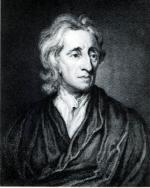|
This section contains 2,088 words (approx. 7 pages at 300 words per page) |

|
John Locke (1632–1704), was an English philosopher, Oxford academic, and occasional bureaucrat. He was born at Wrington, Somerset, on August 29 and died at Oates, Essex on October 28. Locke's fame as a philosopher rests chiefly on two works: An Essay Concerning Human Understanding (1689) and Two Treatises of Government (1689). The former became a chief textbook of the European enlightenment and subsequent philosophy. The latter deeply influenced both the Declaration of Independence (1776) and the Constitution of the United States (1787), a document that made promoting the "progress of science and useful arts" one of its distinguishing features (Article I, section 8). These facts establish his reputation as one of the most influential modern philosophers and signal his importance in issues related to science, technology, and ethics.
Locke's strategy in his two most influential works is characteristic of early modern thought. First he sets out to clear away errors and conceits left over...
|
This section contains 2,088 words (approx. 7 pages at 300 words per page) |

|


